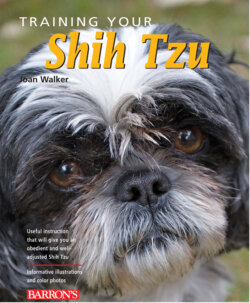Читать книгу Training Your Shih Tzu - J. Walker - Страница 9
На сайте Литреса книга снята с продажи.
Bred for Companionship
ОглавлениеThe Shih Tzu is unique in that he is one of a handful of breeds not bred for a working purpose. The Shih Tzu was not bred to herd sheep, track rabbit trails, guard livestock, or be a watchdog. For centuries, the Shih Tzu’s only purpose in life has been to serve as a companion dog.
Not have a “working” background has its plusses and minuses when it comes to training. Training your Shih Tzu will not be the same as training a Golden Retriever, but that’s not a bad thing! Understanding the Shih Tzu’s strengths and weaknesses when it comes to learning new skills will help you understand how best to approach training and get top results.
Here’s a short rundown of some Shih Tzu qualities that can make training fun.
TZU TIPLittle Dog Syndrome
Owners of toy Weeds often overlook behaviors that would be cause for alarm in a larger dog. Growling, snarling, and lunging at other dogs and people are commonly shrugged off as “acting like a big dog.” No, this is just bad behavior! And, if allowed to continue, it can lead to more serious consequences—for the dog, owner, or both.
Harsh verbal corrections are never necessary with a Shih Tzu and may sour him on training completely.
Intelligence. There’s no question that this breed ranks right up there with some of the canine world’s best and brightest breeds on the doggie IQ chart. The breed is very adept at reading body language and almost intuitive in figuring out what’s being asked of him. Intelligence is a great asset in dog training—if you can keep up with your dog!
Easily handled. Working with a small dog has many advantages, including the ability to easily transport your dog to various places to train. Little dogs can also be exercised more easily, making it less time consuming to “take the edge off” of a rambunctious dog prior to training sessions. Most owners tend to have more confidence in their own training abilities when working with smaller dogs, which translates directly into the dog having more confidence, too.
Shih Tzu are smart, inquisitive, and love to be the center of attention.
No inert drives. Without selective breeding to produce strong instincts such as guarding, hunting, tracking, scenting, retrieving, flushing, etc., the Shih Tzu has no intense genetic drives to distract him. That’s not to say the Shih Tzu can’t get distracted; it just means that this breed doesn’t have generations of breeding to prewire him to respond in certain ways in certain situations.
Craves company. If you’re in the kitchen, your pup will be underfoot. If you walk upstairs, don’t be surprised to hear the quiet padding of your Shih Tzu right behind you. Taking a snooze on the couch? Your Shih Tzu will be right there, too. When a dog has a strong desire to be with his owner and/or family, this makes many aspects of training a bit simpler, including finding your dog to do spontaneous, quick, short training sessions. He’s right there, so why not?
Playful and comical. What is it in the Shih Tzu’s past that makes it such a crowd pleaser? This dog has a sense of humor and loves an audience. If you enjoy teaching your dogs parlor tricks (Shake, roll over, play dead), you are going to love working with your Shih Tzu.
